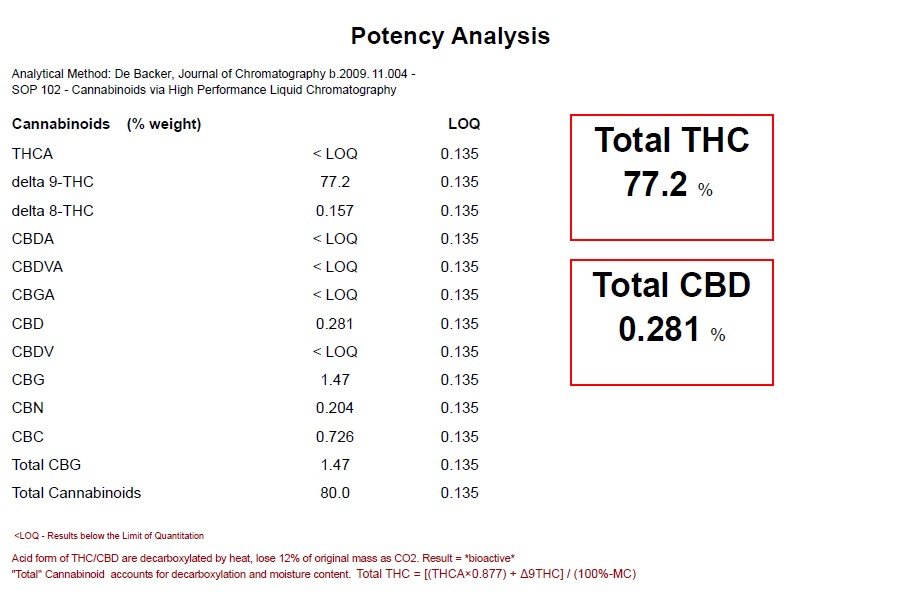
OLCC Compliance Testing
Rose City Labs started with medical marijuana and has been providing cannabis compliance tests for over 10 years. If you want to learn more about our services give us a call or schedule below.
We make all the OLCC compliance tests for hemp, marijuana and adult use cannabinoids (Potency, Pesticides, Water Activity, Moisture Content, and Residual Solvents) available to all of Oregon. You can schedule a cannabis batch sampling, or just provide us with R&D samples for your grow or breeding program.
-
Current marijuana testing standards include: pesticides, water activity, moisture content and adult use cannabinoid and CBD concentration. Per recent amendments to OLCC testing, marijuana testing will include mycotoxins beginning July 1, 2022, and heavy metals and microbiological screening starting March 1, 2023.
-
Current testing standards for concentrates and extracts include: pesticides, solvents, and adult use cannabinoid and CBD concentration. Concentrates and extracts will also be subject to the changes to OLCC testing requirements and will have to be tested for: mycotoxins ( July 1, 2022), heavy metals, and microbiological screening (March 1, 2023).
-
Finished inhalable cannabinoid products is a new category of marijuana items under the testing rules. Rules specific to testing them can be found under OAR 333-007-0341. Examples of items that fit under this category are things like infused pre-rolls or inhalable cannabinoid products with non-cannabis additives. These items will be required to be compliance tested once they are finished, but before they are packaged, for pesticides, solvents (if required), adult use cannabinoids and CBD concentration, mycotoxins if manufactured on or after July 1, 2022, heavy metals contaminants if manufactured on or after March 1, 2023, and microbiological contaminants if manufactured on or after March 1, 2023.
-
A marijuana item or industrial hemp-derived vapor item must be tested for adult use cannabinoid concentrations. In order to be compliant you will have to test for: delta-9 THC, delta-9 THCA, CBD and CBDA; delta-8 THC testing will be required after July 1, 2022,
Rose City Labs can provide compliance testing and packaging. We also provide cannabinoid analysis for R&D purposes. We test for: delta-9 THC, delta-8THC, THC-A, CBD, CBD-A, CBC, CBG, CBG-A & CBN
-
The use of pesticides in crop cultivation is not new, and cannabis crops are no exception. A pesticide is a substance used for destroying insects or other organisms harmful to cultivated plants or to animals. This can include herbicides for destroying weeds, insecticides for controlling insects, fungicides to prevent mold and mildew, disinfectants to prevent the spread of bacteria, and poisons used to control mice and rats. The most common pesticide classes associated with cannabis are insecticides, acaricides (tick and mite), and fungicides. The OLCC requires pesticide testing for marijuana, concentrates or extracts, industrial hemp-derived vapor items, & finished inhalable cannabinoid products. We test for the 59 pesticides required by the OLCC:
Abamectin, Acephate, Acequinocyl, Acetamiprid, Aldicarb, Azoxystrobin, Bifenazate, Bifenthrin, Boscalid, Carbaryl, Carbofuran, Chlorantraniliprole, Chlorfenapyr, Chlorpyrifos, Clofentezine, Cyfluthrin, Cypermethrin, Daminozide, DDVP (Dichlorvos), Diazinon, Dimethoate, Ethoprophos, Etofenprox, Etoxazole, Fenoxycarb, Fenpyroximate, Fipronil, Flonicamid, Fludioxonil, Hexythiazox, Imazalil, Imidacloprid, Kresoxim-methyl, Malathion, Metalaxyl, Methiocarb, Methomyl, Methyl parathion, MGK-264, Myclobutanil, Naled, Oxamyl, Paclobutrazol, Permethrins, Phosmet, Piperonyl_butoxide, Prallethrin, Propiconazole, Propoxur, Pyrethrins, Pyridaben, Spinosad, Spiromesifen, Spirotetramat, Spiroxamine, Tebuconazole, Thiacloprid, Thiamethoxam, Trifloxystrobin
-
Though the main solvents used in cannabis extraction are butane and ethanol, the OLCC requires solvent testing for cannabis concentrates or extracts, industrial hemp-derived vapor items, & finished inhalable cannabinoid products. Excess butane or ethanol could pose health risks, and other solvents may end up in your cannabis products because they are contaminants of the solvents used in extraction, or because they are used to clean production equipment used in the process. Rose City Labs has been servicing the cannabis industry for a decade and continues to provide testing that meets current and proposed standards, we test for 24 solvents as required by the OLCC.
1,4-Dioxane, 2-Butanol, 2-Ethoxyethanol, 2-Propanol (IPA), Acetone , Acetonitrile, Benzene, Butanes, Cumene, Cyclohexane, Dichloromethane, Ethyl acetate, Ethyl ether, Ethylene glycol, Ethylene Oxide, Heptane, Hexanes, Isopropyl acetate, Methanol, Pentanes, Propane, Tetrahydrofuran, Toluene, Xylenes
-
Aflatoxin B1, B2, G1, G2 and Ochratoxin A
Changes to OLCC testing will require mycotoxins testing as of July 1, 2022.
Aflatoxins are produced by different species of Aspergillus, particularly A.flavus, A.oryzae, A.fumigatus and A.parasiticus. Aflatoxins B1 , B2 , G1 and G2 are particularly dangerous to humans and animals. Aflatoxins are some of the most carcinogenic substances in the environment. They cause liver cancer, and have been linked to other types of cancer. Aflatoxin can lead to liver damage, cancer, mental impairment, abdominal pain, hemorrhaging, coma, and death.
Ochratoxin A (OTA), the most prevalent and relevant fungal toxin produced by Aspergillus species and Penicillium species. Ochratoxin A is formed during the storage of crops and is known to cause a number of toxic effects in animal species. Ochratoxin A is a chronic nephrotoxin, affecting kidney function. In addition to being a nephrotoxin, animal studies indicate that ochratoxin A is a liver toxin, an immune suppressant, a potent teratogen, and a carcinogen. OTA is suspected of being the main agent responsible for human Balkan endemic nephropathy (BEN) and associated urinary tract tumors.


